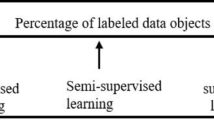Abstract
Revealing the common underlying structure of data spread across multiple data sites by applying clustering techniques is the aim of collaborative clustering, a recent and innovative idea brought up on the basis of exchanging information granules instead of data patterns. The strength of the collaboration between each pair of data repositories is determined by a user-driven parameter, both in vertical and horizontal collaborative fuzzy clustering. In this study, Particle Swarm Optimization and Rough Set Theory are used for setting the most suitable values of the collaboration links between the data sites. Encouraging empirical results uncovered the deep impact observed at the individual clusters, allowing us to conclude that the overall effect of the collaboration has been improved.
Preview
Unable to display preview. Download preview PDF.
Similar content being viewed by others
References
Jain, A.K., Murty, M.N., Flynn, P.J.: Data Clustering: A Review. ACM Computing Surveys 31(3), 264–323 (1999)
Sato-Ilic, M., Jain, L.: Introduction to Fuzzy Clustering. In: Sato-Ilic, M., Jain, L. (eds.) Innovations in Fuzzy Clustering. Studies in Fuzziness and Soft Computing, vol. 205, pp. 1–8. Springer, Heidelberg (2006)
Sato-Ilic, M., Jain, L.: Kernel based Fuzzy Clustering. In: Sato-Ilic, M., Jain, L. (eds.) Innovations in Fuzzy Clustering. Studies in Fuzziness and Soft Computing, vol. 205, pp. 89–104. Springer, Heidelberg (2006)
Sato-Ilic, M., Jain, L.: Self Organized Fuzzy Clustering. In: Sato-Ilic, M., Jain, L. (eds.) Innovations in Fuzzy Clustering. Studies in Fuzziness and Soft Computing, vol. 205, pp. 125–150. Springer, Heidelberg (2006)
Pedrycz, W.: Collaborative Fuzzy Clustering. Pattern Recognition Letters 23(14), 1675–1686 (2002)
Mitra, S., Banka, H., Pedrycz, W.: Rough-Fuzzy Collaborative Clustering. Man and Cybernetics 36(4), 795–805 (2006)
Bezdek, J.C.: Pattern Recognition with Fuzzy Objective Function Algorithms. In: Pattern Recognition with Fuzzy Objective Function Algorithms, Plenum Press (1981)
Pedrycz, W.: Knowledge-Based Clustering: From Data to Information Granules. John Wiley and sons, Chichester (2005)
Pedrycz, W., Vukovich, G.: Clustering in the Framework of Collaborative Agents. IEEE International Conference on Fuzzy Systems 1, 134–138 (2002)
Pawlak, Z.: Rough sets. International Journal of Computer and Information Sciences 11(1), 341–356 (1982)
Kennedy, J., Eberhart, R.: Particle Swarm Optimization. IEEE International Conference on Neural Networks 4, 1942–1948 (1995)
Kennedy, J., Eberhart, R.: Swarm Intelligence. Morgan Kaufmann, San Francisco (2001)
Santana-Quintero, L., Ramírez-Santiago, N., Coello, C., Molina, J., García, A.: A New Proposal for Multiobjective Optimization using Particle Swarm Optimization and Rough Set Theory. In: Runarsson, T.P., Beyer, H.-G., Burke, E., Merelo-Guervós, J.J., Whitley, L.D., Yao, X. (eds.) Parallel Problem Solving from Nature - PPSN IX. LNCS, vol. 4193, pp. 483–492. Springer, Heidelberg (2006)
Omran, M., Engelbrecht, A., Salman, A.: Dynamic Clustering using Particle Swarm Optimization with Application in Unsupervised Image Classification. Computing and Technology 9, 199–204 (2005)
Wang, X., Yang, J., Teng, X., Xia, W., Jensen, R.: Feature Selection Based on Rough Sets and Particle Swarm Optimization. Pattern Recognition Letters 28(4), 459–471 (2006)
Author information
Authors and Affiliations
Editor information
Rights and permissions
Copyright information
© 2007 Springer-Verlag Berlin Heidelberg
About this paper
Cite this paper
Falcon, R., Jeon, G., Bello, R., Jeong, J. (2007). Learning Collaboration Links in a Collaborative Fuzzy Clustering Environment. In: Gelbukh, A., Kuri Morales, Á.F. (eds) MICAI 2007: Advances in Artificial Intelligence. MICAI 2007. Lecture Notes in Computer Science(), vol 4827. Springer, Berlin, Heidelberg. https://doi.org/10.1007/978-3-540-76631-5_46
Download citation
DOI: https://doi.org/10.1007/978-3-540-76631-5_46
Publisher Name: Springer, Berlin, Heidelberg
Print ISBN: 978-3-540-76630-8
Online ISBN: 978-3-540-76631-5
eBook Packages: Computer ScienceComputer Science (R0)




